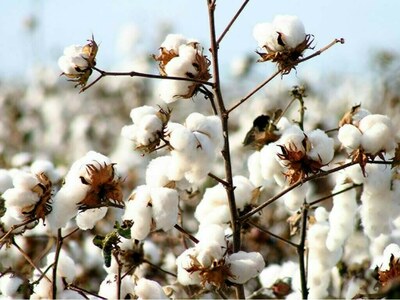Cotton Market Shows Stability Amidst Concerns Over Import Policies
Cotton prices have largely remained steady, although trading volume has been limited. New York cotton futures have seen a price increase. The decision regarding the Export Finance Scheme (EFS) is likely to be deferred until the budget announcement. Expressing their discontent with the government’s handling of the situation, the Pakistan Cotton Ginners Association (PCGA) has reportedly appealed to the Chief Justice of the Supreme Court after initially contacting the Army Chief, seeking judicial resolution of the matter.
Shahid Rasheed Butt, former President of the Islamabad Chamber of Commerce and Industry, has noted that the import bill is escalating due to increased imports of cotton, cotton yarn, and textiles.
Sajid Mahmood, Head of the Technology Transfer Department at the Central Cotton Research Institute Multan, has stated that the 18% sales tax on local cotton and the EFS facility on imported cotton are adding to the financial strain on cotton farmers and domestic industries.
Local Market Conditions
Over the past week, the local cotton market has generally been stable. Trading prices ranged from 15,500 to 17,500 rupees per maund, varying based on quality and payment terms. Mills have shown some interest in purchasing cotton; however, ginners’ cotton stocks are gradually decreasing. The rapid influx of imported cotton, for which mills are making payments, is causing financial difficulties in the local market. Furthermore, imports of cotton yarn and fabric are negatively impacting textile spinners, who are struggling to sell their yarn. The weaving sector is also experiencing adverse effects.
EFS Discussions and Appeals
FPCCI, APTMA, PCGA, and other organizations have engaged with government departments regarding the EFS issue. The PCGA, frustrated with the lack of progress, has appealed to the Army Chief for assistance in resolving EFS-related challenges to revitalize cotton production and address ginning issues. A decision on this matter is expected to be included in the upcoming budget.
Cotton Cultivation Concerns
Reports regarding ongoing cotton cultivation vary. While the condition of the cotton crop is favorable in some areas, others are facing water scarcity issues. Concerns are also growing about the impact of the heat on newly sprouted plants. Delays in cotton sowing are anticipated in several regions due to water-related problems.
Rising Import Bill
The import bill continues to rise due to the import of cotton, yarn, and fabric. Shahid Rasheed Butt has emphasized that growing competition in the global textile market is a concern for Pakistan, which is also increasing global competition and the business costs of the textile sector. The decline in cotton production is exacerbating the burden on the import bill.
PCGA Seeks Judicial Intervention
Expressing disappointment with the government’s response, Dr. Jassu Mal Leemani, Chairman of PCGA, has requested the Chief Justice of the Supreme Court of Pakistan for intervention regarding perceived discriminatory treatment against local cotton farmers. The appeal highlights the difficulties faced by local textile spinners, manufacturers, and cotton farmers due to issues related to GST and EFS, urging action to ensure fair competition.
Current Market Rates
The rate of cotton in Punjab and Sindh, based on quality and condition, ranges from Rs 15,500 to Rs 17,500 per maund. The Spot Rate Committee of the Karachi Cotton Association has maintained the rate at Rs 16,700 per maund.
International Market Overview
Naseem Usman, Chairman of the Karachi Cotton Brokers Forum, noted that international cotton prices have remained generally stable. New York cotton futures are currently trading between 68 to 70 cents per pound. According to the USDA’s weekly export and sales report, sales for the 2024-25 season reached 104,000 bales, with Vietnam being the top purchaser at 34,400 bales, followed by India at 22,500 bales, and Pakistan at 16,500 bales. For the 2025-26 season, 38,000 bales were sold, with Indonesia leading purchases at 13,200 bales, followed by Peru at 9,700 bales, and Honduras at 9,300 bales.
Call for Policy Reforms
Chairman PCGA Dr. Jassu Mal has articulated concerns about unfair tax policies impacting Pakistan’s agricultural sector, disadvantaging local cotton farmers and ginners while favoring imported cotton, emphasizing the urgent need for policy reforms to address this imbalance, which is crippling the domestic cotton industry.
Local cotton farmers and ginners face a significant tax burden, including an 18% General Sales Tax (GST) on ginning, along with various withholding and indirect taxes. Conversely, imported cotton is exempt from these taxes, entering the country with zero percent sales tax and no import duties. This has led to a decline in cotton cultivation and production, as farmers struggle to compete with cheaper, tax-free imports.
The current situation has prompted farmers to shift to other crops such as sugarcane, rice, and maize, which receive better government support and face fewer tax-related challenges. This shift poses a threat to Pakistan’s textile industry and the national economy.
Dr. Mal clarified that the appeal is not for subsidies but for equal treatment and has requested a review of current tax policies.
Sajid Mahmood highlighted the imposition of an 18% sales tax on local cotton and duty-free import of cotton under the Export Finance Scheme (EFS) is undermining the competitive position of local producers.



Comments (0)
No comments yet. Be the first to comment!
Leave a Comment